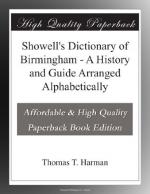14,925; G. Baker, J.A. Cooper, Jesse Collings,
Rev. H.W. Crosskey, Dr. Sebastian Evans, Rev.
H.W. Holland, —— Kirkwood, G.B.
Lloyd, Dr. Merson, W. Middlemore, W. Radford, ——
Raffles, and Archdeacon Sandford. 29,183 voters, out
of 52,340, recorded their votes. A considerable
amount of party feeling was shown in the contest,
the candidates being divided (with one or two exceptions)
into two distinct classes, the Liberals who wanted
the Bible read in the schools without explanation
or comment, and the Churchmen who went in for Scriptural
teaching. The latter party obtained the majority
by electing the whole of the eight they put in nomination,
the Liberals, who thought they could run the whole
fifteen, find that by grasping at too much they had
lost all the power they had fondly hoped to acquire.
The first meeting of the Board was held Dec. 15, Mr.
Sargant being elected chairman and Mr. S.S. Lloyd
vice-chairman. During the three years’
reign of this Board the religious question was a continual
bone of contention, the payment of school fees for
the teaching of the Bible in denominational schools
being denounced in the strongest of terms in and out
of the Board-room by the “Irreconcileables,”
as the Nonconforming minority were termed. The
practical results of the Board’s proceedings
may be summed up thus: The Education Department
decided that school accommodation was required for
15,000 children; the School Board borrowed L40,000,
received L20,500 from the rates, built five schools
(in Lingard-street, Jenkins-street, Farm-street, Garrison-lane,
and Steward-street), which would hold about 6,000
children, boys, girls, and infants, and engaged fifteen
teachers, 52 pupil teachers, and two assistants.
They also allowed the sum of 1s. per week for every
child detained in a certified industrial school, committed
by the borough magistrates, enforced in some measure
the compulsory clauses of the Education Act, entered
into negotiations for the building of four other schools,
quarrelled with the Town Council, and dissolved without
thanking their chairman.—The second election
of the School Board took place Nov. 17, 1873, when
eighteen persons were nominated, as follow (the three
last being the unsuccessful candidates):—G.
Dixon, M.P., 39,447 votes; J. Chamberlain, 38,901;
Miss Sturge, 37,260; C. Vince, 36,505; J.S. Wright,
36,417; R.W. Dale, 34,986; G. Dawson, 34,301;
Jesse Collings, 33,877; Canon O’Sullivan, 32,087;
S.S. Lloyd, 29,783; Dr. Burges, 24,582; A.J.
Elkington, 24,213; W.L. Sargant, 24,207; Rev.
F.S. Dale, 23,864; Dr. Wilkinson, 23,157; G.
Heaton, 23,140; W.H. Greening, 22,881; and W.
Warlow, 19,193. This election was fought with
all the rancour of a political contest, Tory and Liberal
being pitted against one another in the name of religion,
the Book of Books being dragged through the mire of
party warfare in the most outrageous manner, discreditable
to both sides, and especially so to those teachers
of the Gospel, who delighted in the almost blasphemous




